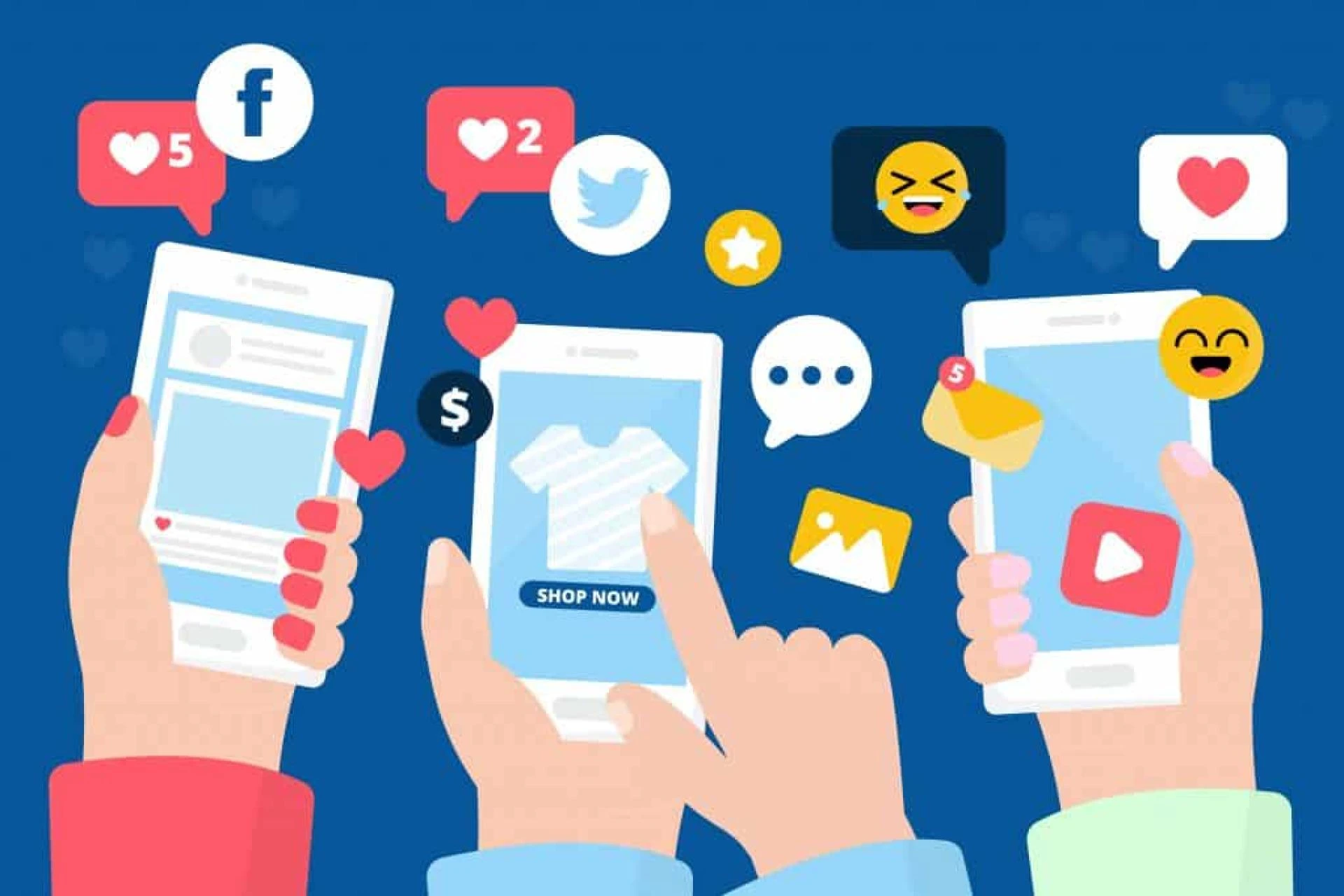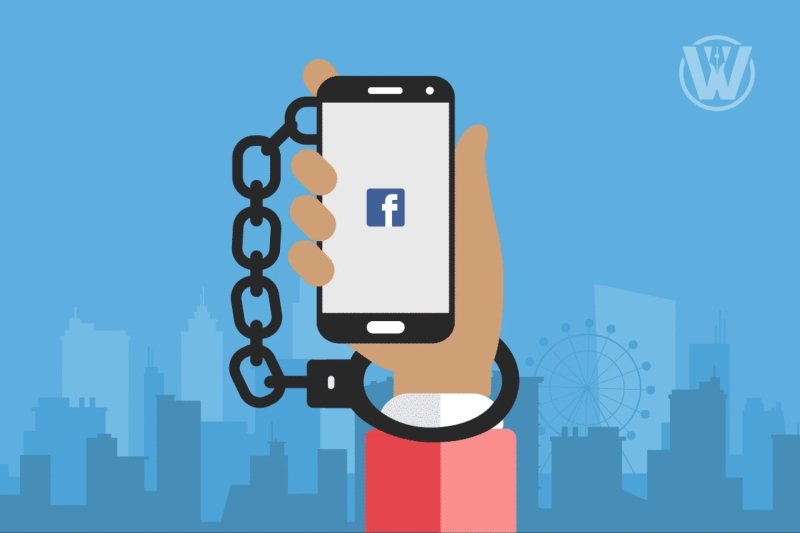Are you Addicted to Facebook? In this article we talk about the 7 major signs of Facebook addiction and how it can affect you life in a negative way.
When Facebook first launched in 2004, it ushered in an era of possibilities. The way internet was used around the world was going to change forever.
Now we could find a friend just by searching their name on a tiny unassuming text box! People around the world looked up old school friends or relatives in faraway countries and re-connected at the click of a button.
A couple of years passed in discovering and finding our way through Facebook, and before we knew it, we were hooked. By this time, Facebook has become a household name and has started taking up a lot of our free time.
Initially it was just the posts on our timelines by our friends that we were looking at. But very soon Facebook rolled out new features solely for entertainment.
A decade of games, silly quizzes and too-much-information later, Facebook continued to seep into our daily lives, by now slowly shaping into an addiction.
And now, finally, it’s time to ask, how much is too much? Are we addicted to FB?

What Is Facebook Addiction?
Being addicted to Facebook isn’t a medically defined disorder yet, however, researchers use the term to describe individuals who spend an excessive amount of time on the social networking site.
In a recent article on Facebook Addiction, The American Journal of Psychiatry defined Addiction to Facebook as “a person with Facebook addiction may subjectively experience a loss of control while continuing to use Facebook excessively despite its detrimental effects on the individual’s life”.
However, excessive use may not always be considered an addiction; a person may spend prolonged periods of time on Facebook for work and still not be addicted to it.
Who Are The Most Vulnerable To Facebook Addiction?
College students are the most vulnerable to get addicted to Facebook and it tends to have a higher impact on women.
Certain personality traits such as narcissism, high levels of paranoia, and low self-esteem also have been observed with compulsive Facebook usage.
According to research, introverted, lonely or depressed individuals who are more comfortable online modes of socialisation are also prone to addictive social media use.
Researchers have also found a correlation between anxiety, depression and Facebook use, pointing towards the fact that individuals with underlying mental illnesses may use Facebook as an escape from their own personal lives.
Social insecurities, such as inferiority complex, fear of missing out, and fear of having a negative social image, are associated with an increased Facebook use.
What Are The Common Signs Of Facebook Addiction:
- Spending almost all your time on Facebook without realizing it:
When you start using Facebook for longer than you intend to and do not realize when to stop, spending hours online instead of minutes, it could be a sign that you are addicted to Facebook.
This can lead to whiling away your time instead of working or being productive, leading to unfinished goals and bad self-image.
- Using Facebook as an escape:
This is when you try to fix your bad mood or cure your boredom through Facebook instead of trying to actively fix problems in your life.
Doing this will lead to the individual losing their sense of reality and lead to a negative outcome as they ignore their problems for a few moments of social gratification online.
- Facebook ruining your daily routine:
If you find yourself using Facebook late at night instead of sleeping or using Facebook early in the morning before even getting out of bed, there’s a serious problem.
Prioritising Facebook over your sleep and daily chores means that you have given it a high importance in life and it can lead to serious health issues in the long run.
- Using Facebook instead of going through with plans:
When you treat your online life as more important than your social life offline, it’s a sign that you are addicted to Facebook. You may lose important relationships and friendships because of your difficulty to differentiate and prioritize between the online and offline world.
- Difficulty in being away from Facebook:
If you find yourself promising 5 more minutes before turning off Facebook every time, or if you find yourself drifting back towards the networking app, you may have a problem.
Having trouble letting go of anything is dangerous, but even more so when it’s not productive for you or even harmful.
- Obsessing over people online:
We have all scrolled through pages of our exes or online influencers. But it becomes a problem when you start obsessing over them and start feeling jealous, angry, irritated or even infatuated by them and their online persona.
Losing touch with reality and believing in a curated image of a person online can be harmful to self-esteem and can cause an identity crisis.
- Following irrational trends and challenges:
We all saw the ALS ice bucket challenge and the Kylie Jenner lip challenge. But we didn’t try them because we knew they could be harmful to us.
If you have tried dangerous challenges despite knowing better, you are addicted to Facebook and need to seek immediate psychological help.
Why Is It So Easy To Get Addicted To Facebook?
Facebook activates the production of the dopamine hormone, which motivates you to continue doing the same activities, in the brain by providing a sense of instant social acceptance in the way of likes, comments and positive response.
When something is shared by you on Facebook, likes pour in and other notifications keep you constantly checking who is looking at your posts and profile, giving a sense of false accomplishment.
Positive comments on posts can ascertain a significant upliftment to self-esteem, just in the same way that likes on pictures posted do.
As with any addiction, soon you began to crave this online support and positivity, especially when you’re going through a rough time.
This way, Facebook can soon turn into a coping mechanism to deal with negative emotions and circumstances in life in a way similar to narcotic substances such as drugs and alcohol.
What Are The Consequences Of Facebook Addiction?
Facebook can help foster healthy relationships and enhance self-esteem and your social circle; however, extreme use can lead to negative consequences that could very well destroy the same things that it strives to develop.
Facebook can be counterproductive to academic and professional performance. It has been found that Facebook users have worse academic achievements and spend lesser hours hitting the books than non-Facebook users.
This is because it accelerates procrastination and makes you feel as if you’re being fruitful when you’re actually just wasting your time.
An excessive amount of usage has also been proven to derail regular sleeping habits. According to research people who are addicted to Facebook reported fragmented sleep and later bedtimes and waking up times when compared to people without a Facebook addiction.
Another problem is that these users typically present a more glamorous and well put together version of themselves online.
According to various studies, researchers have found that consuming information about other individuals and their lives can evoke jealousy.
That means that people who regularly use Facebook are more likely to feel discontented in their own lives and think that others have superior lives than theirs.
Whereas those who have a spend more time offline will tend to have a much more rational and pragmatic view of other people’s lives and realize that no one genuinely had zero problems.
There is also proof that jealousy arising from striving for a high social ranking can make people susceptible to depression.
How Do I Cure My Facebook Addiction?
If any of these above signs mirror your use of Facebook, acknowledge that you are addicted to Facebook and may be using up too much of your tangible life by focusing on your virtual intangible persona.
If you have decided that you want to address your uncontrollable social media addiction here are some tips to try and cure your Facebook addiction:
- Be honest with yourself:
Don’t brush off your addiction as something insignificant. Recognize your problem and tell yourself that you must work on yourself to overcome it.
- Recognize your desires:
Whenever you feel the urge to open the Facebook app, ask yourself the purpose behind it. This way you can make a mental note of the trigger behind this urge.
- Keep your phone away:
Do not keep your phone nearby while doing important activities, if and when possible. This will help you work without getting distracted.
- Keep yourself busy:
Make a to-do list and try to keep yourself busy so that you don’t spend too much of your time online and do something productive.
- Replace your Addiction with a Productive Substitute
Try to eliminate the unwanted tendency of using Facebook by settling upon on a more desirable habit that you would like to replace it with.
Apply this idea by choosing to do something good for you like reading, meditation, exercise or art whenever you feel tempted to check your Facebook page.
- Set a timetable:
Setting a daily timetable can help if you designate specific periods of the day to specific tasks. This can help you feel more in control of your life instead of allowing you to scroll through Facebook without keeping track of time.
- Set an app timer:
Most smartphones in 2020 have a feature where you can set a timer for particular apps after which you can’t access the app any longer for the rest of the day. This can be especially helpful for those who don’t realize how fast time flies when on Facebook.
- Track your Facebook usage:
Count hours on how long you use Facebook and try to evaluate whether it matches up with your daily goals for Facebook usage.
- Make rules for yourself:
Make rules for your social media usage, such as “if I want to open Facebook on my phone, I will have to get up and sit outside of my workspace”. Such rules can help lessen the time spent on Facebook and increase productivity.
- Log out of Facebook:
This will make you manually log in every time you want to use the website. Doing this will give you some time to ask yourself if you really need to go online by making you do unwanted work through the process. This is most effective when you use it on a web browser.
- Turn off notifications:
Another way to overcome your Facebook addiction is to turn off the app notifications. It’s hard to resist checking your account when you constantly get notified at each new social update.
Facebook is designed to ping you as many times as possible to get you back online.
It’s much easier to avoid the social networking site when you intentionally decide to check it, rather than seeing an alert in the form of a notification that commands your attention towards it and diverts you from the task at hand.
Lessen the number of disturbances in your daily life by turning off all notifications within the app.
- Delete the app:
Another tip is to do away with Facebook itself, delete the app off your phone. This way you would have to open a browser every time you want to check Facebook and would reduce your interest in opening Facebook.
- Disable your account:
The last and most extreme tip is to disable your account, doing so can help control your urges to check Facebook constantly and reduce your dependence on it.
Addiction to Facebook isn’t uncommon in today’s technologically dependent world. However, this is no replacement for genuine, face-to-face interaction in real life.
If you think you have a problem, try to tackle it. Start working towards your goals today to improve your overall well-being.


